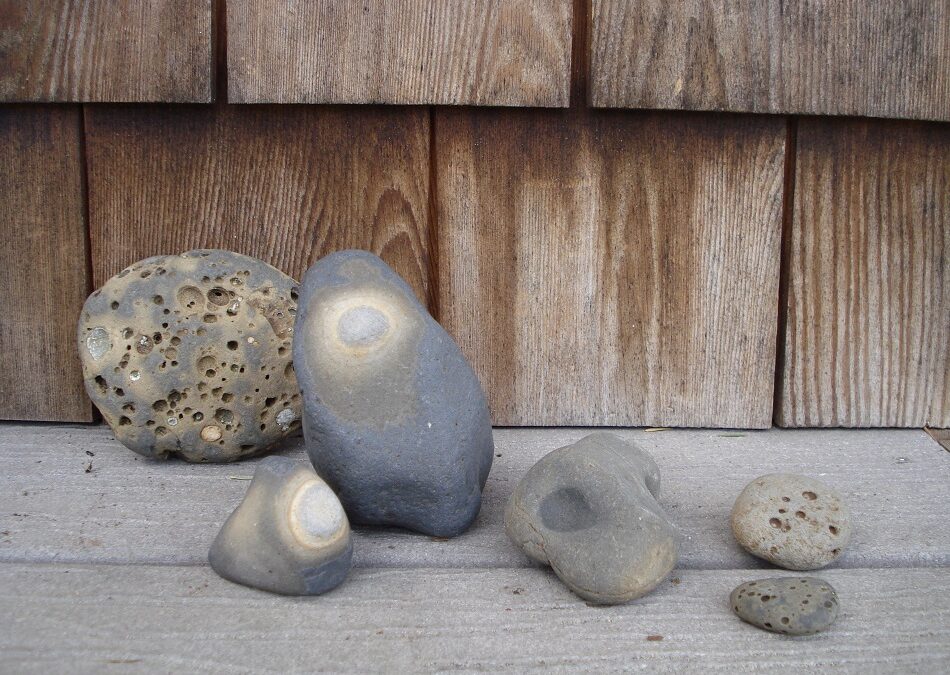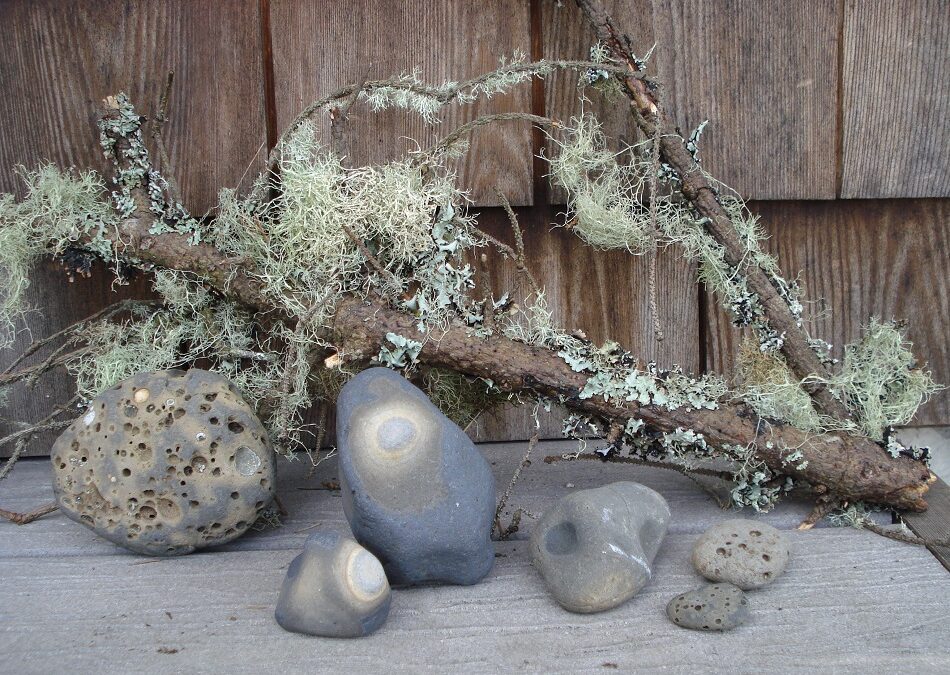
by wp-admin | Dec 9, 2021 | Exploring the Mental Fitness Formula
This little stone family invites you to take a big leap into wiser Adult coping. You can’t guess what these rock people’s brains might be like, can you? How would you cope with a co-worker who looked like these one-eyed stones? You could suspend a few toxic beliefs for a while. Would you get upset if he didn’t approve of something you did? Would you compare your performance to his? Would you blame him or yourself if you had communication or cooperation problems?
Many toxic beliefs assume that we humans all share similar capabilities. Improved brain imaging techniques are revealing how different human brains actually can be. It’s your Adult’s job to read situations accurately, taking brain differences into account, as you interact with others. How might your own brain differ in some ways that make it harder or easier for your Adult? Everyone’s Adult must manage toxic beliefs, Child ranting and archaic brain habits like black-and-white thinking to reduce fight-or-flight reactions. But for many people it’s more difficult, or even impossible for them to do all this reliably.
These people are wired to have more overwhelming fight-or-flight challenges. If you’re in this group you may react more intensely and quickly than most people. You may have more trouble getting your Adult to focus or observe your inner being. You may not be able to interpret what’s happening in a situation. You may not be able to remember what others say or what you’ve just read. You may not be able to guess from another person’s body language and tone of voice how they’re feeling. These problems interfere with Adult self-management, no matter how hard a person tries to master mental fitness skills. Your Adult needs to recognize this to keep you out of frequent, defensive fight-or-flight. It must also realize that others may need compassion when their behavior is difficult. They may be doing the best that they can.
People don’t have to look like one-eyed stones to deserve a thoughtful, Adult approach. Belief #3, that people (including you) who don’t meet a set standard should be blamed or punished, is not helpful for this. An ADHD child who disrupts a classroom requires extra guidance and perhaps medication. Criticizing his parents and punishing him just arouses their fight-or-flight reactions, which interfere with their Adult problem-solving abilities. When we’re angry with others, our own Adult abilities suffer as well. Whether it’s a boss who feels compelled to micro-manage her team or an engineer who irritates those around him with his lack of sensitivity, Adult problem-solving is required for solutions. Blaming people who can’t regulate themselves is understandable, but managing them to protect others and the productivity of a group is more humane and helpful.
Part II, Chapter 1 of my book offers an overview of the most common brain differences that make it harder to keep your Adult in charge, along with references for further study. These differences include Elaine Aron’s Highly Sensitive Person trait, described with a self-test at her website, www.hsperson.com, Attention Deficit Disorder (ADD), including associated hyperactivity and learning disabilities, Borderline, Schizoid, Anti-social and related personality disorders, Bipolar Disorder and autism spectrum disorders. Future posts will discuss examples of how some of these operate to make fight-or-flight harder to manage.

by wp-admin | Dec 9, 2021 | Exploring the Mental Fitness Formula
To protect yourself from hurt and anger over any brain differences that make it harder for your Adult, you must build shelter into your Wise Parent. You can extend it to others as well. As noted in Post # 16, there are several wired-in conditions that can make you feel like you’ll never fit in to our overwhelming life here on planet earth. The old philosopher’s advice, “Know thyself,” has lots of resonance here.
As an example I’ll share how I’ve worked to manage and accept my very high level of Elaine Aron’s Sensory Processing Sensitivity Trait,*which I’ve always had to work hard to manage. When I read her first book, The Highly Sensitive Person, in 1997, I recognized many aspects of myself in her pages about HSPs. When I finished it, I said to myself, “another fitting title would be, ‘The Highly Irritable and Cranky Person.’” I could recall, as early as age ten, struggling to be calmer, less quickly annoyed, and less judgmental with others than came easily to me. I didn’t want to be like my angry, intolerant mother, who was no-doubt also an HSP, along with her other, more painful problems.
When I could walk on the beach or spend quiet time with a friend or two, I was very peaceful. I even began to write poetry about the beautiful Indiana Dunes where I lived. HSPs tend to have a special appreciation for nature and beauty; it helps compensate for our more tiresome traits. You’ll notice that the picture above features the same family as the one in post #16, but the stone people now have a sheltering branch to comfort them. When we HSPs and others with other challenging brain differences identify how our brains operate, our Adult must seek environments where we can thrive.
Our Wise Parent must revise Critical Parent messages that if we don’t fit in, we’re failing socially or in our jobs. It must also revise Indulgent Parent messages that would have us withdraw in self-pity and greatly limit our lives and happiness. No, we can’t expect others to recognize on their own that we can’t always handle what they can in a situation. Anyone who goes to an intense movie with me for the first time, gets to listen to why I had to leave in the middle to regroup and calm myself.
My friends accept this about me; I must accept that some people will fault me for it, because they can’t understand it. Then I must provide an internal sheltering branch, to feel good about myself anyway. A client I knew who had Attention Deficit Disorder, but whose wife was constantly angry with his slip-ups, told me that when he learned he had ADD, “I realized I wasn’t an asshole, I just had ADD.” He worked hard to compensate, but he learned to do this too late for his wife.
We HSP’s can be anything but sensitive to others if we don’t find the sheltering branches we need to help keep us out of fight-or-flight. We can be highly irritable and cranky if we’re over-tired, badly nourished, overwhelmed by noise, scents or light. I’ve always had to remove the tags in the necks of my clothes. We need stronger-than-average Adults to cope well socially, to ensure that, in my words “we’re fit for human habitation.” Because we’re also very conscientious, we can feel terrible for our lapses in empathy or self-control.
I’ve polled many of my hundreds of HSP clients about how they reacted to their junior high social experience. Many said that they never really tried again to participate in a group, and always felt anxious around others. We HSPs who are very out-going by nature can’t withdraw easily. We get lonely and long for the authentic and loving relationships we can forge when we manage our HSP trait well. Everyone has environments that feel good or bad to them. We all do best when our Adult builds a Wise Parent to support us in seeking ours. I think we who are different are like the canaries in the mining cave; our discomfort can warn the more comfortably wired people that it might be time to find a more sheltering branch too.


